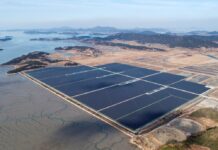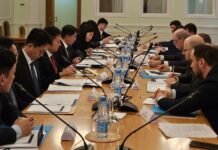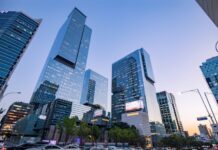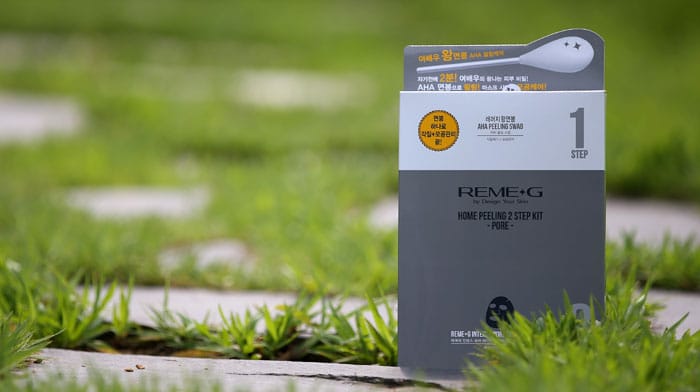
Reme+G face masks contain a special cotton stick that exfoliates the dead skin cells off the face. Made by Ancors, this product ‘tightens’ the pores and moisturizes the skin.
“Natural fermentation components supply nutrition to the skin. After using the mask, my skin has visibly moistened. I can feel that my skin has acquired nutrients and moisture, which makes me feel really happy.”
This is part of a review of skincare face masks made by Labiotte, a Korean skincare and cosmestic brand, written by a Chinese woman on her Weibo profile. Along with her review, she checked how much moisture her skin contained before and after using the product, proving the mask’s moisturizing effects.

A user writes a detailed review of a skincare mask on her Weibo profile.

Labiotte facial masks contain eco-friendly ingredients, such as cellulose and truffle extract. The company says, ‘nutrition worth a whole bottle of essence,’ is contained in each mask pack.
Recently, Korean facial packs, mask sheets in particular, have been winning international popularity, including in the Sinosphere. It is one of the key shopping items that tourists pick up when travelling in Korea.
Overseas customers have shown a strong interest in Korean skincare masks and Korean cosmetic companies are receiving brand recognition around the globe, building on their range of products that feature good quality and a competitive price. This is all thanks to the R&D undertaken by Korean makeup firms. The cosmetic company Ancors proves this. It recorded annual sales worth 28 KRW billion in 2014 alone, showing a more than 200 percent growth over the previous year’s sales.
Since its establishment in 2009, Ancors has been providing skincare face masks to well-known cosmetic brands on an OEM basis. Focusing on R&D, the firm has now launched its own brand names and produces about 400 kinds of cosmetics, ranging from masks, skin care lines, hair and body care lines and many more. It currently owns ten patents and has applied for three more. Most of its patents concern ingredients and recipes, knowhow in how to make a face mask and pack products, with nine of them already having been commercialized.
The key to the popularity of skincare face masks, says Kim Nagseong, director of the Ancors R&D Center of Skin Science and Cosmetics, is that, “International recognition of Korean luxury cosmetic brands has raised the overall value of all Korean cosmetics. Thanks to such recognition, Korea has been competing with existing leaders in the cosmetics market, such as European or Japanese brands. Focusing on R&D, like researching new ingredients or how to make the sheets themselves, for example, Korean firms have been producing highly effective facial masks that are more competitive in terms of price worldwide.”
In regard to R&D into the ingredients found in cosmetics, Kim says, “Korea’s technological prowess in fermentation-based ingredients has received recognition worldwide, as the country has a one-of-a-kind tradition of fermentation, particularly our fermented foods. Ancors owns patents on the technology to produce fermentation-centered ingredients not only in Korea, but also in Japan, the U.S. and Europe.”
“Apart from technology to produce fermentation-based ingredients,” he added that, “Some of our popular masks include ones that are made with highly enriched ingredients where we extract Oriental medicinal herbs, such as Atractylodes japonica, Forsythia koreana and Glyccyrrhiza glabra, while minimizing the damage of the components.”
“Other popular products include masks that are made with unique ‘Korea-only’ ingredients, such as seawater from near lava rocks on Jeju Island, and naturally carbonated water from Chojeong in Chungcheongbuk-do Province (North Chungcheong Province).”
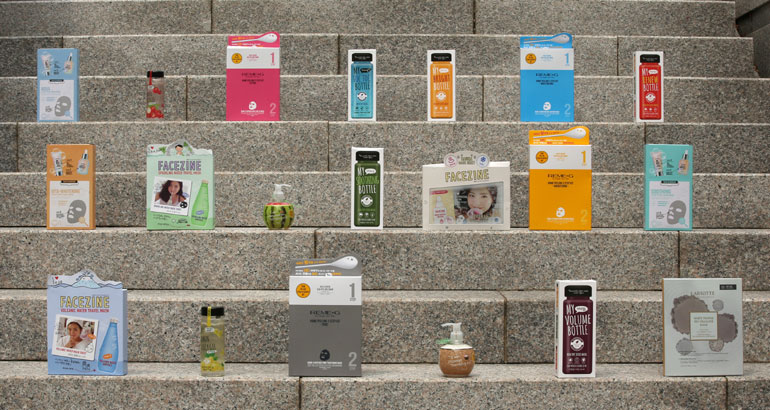
Skincare face masks vary in size, shape and function.
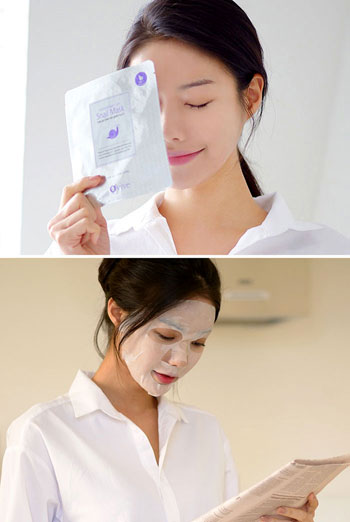
A model puts on a face mask that contains ingredients extracted from snails. Customers love skincare face masks as they see them as an easy and economical way to care for their skin.
It is easy to use a mask pack. First, wash your face with water, put on some toner if you like and put the mask sheet on your face for 10 or 20 minutes. Many masks don’t require you to wash your face afterward. Though it sounds simple, putting on a wet mask sheet is not as easy as it sounds.
Masks have various functions, from “whitening,” moisturing, soothing, nurturing and “lifting” all the way through to supposed anti-aging effects that claim to ease wrinkles. What’s more, they are cheap. For this reason, customers love skincare face masks because they can take care of their skin without having to visit a dermatologist or having to spend a lot of money.
Skincare face mask production technologies have also been evolving. Some facial masks produce a lot of bubbles to clean the skin. You can find masks that include a cotton stick that exfoliates and moisturizes the skin, while “tightening” the pores. Other masks contain special thick and slippery ingredients made from snails that “firms” and moisturizes the skin. One mask makes people feel warm as if they are inside a sauna. This helps to clean the pores, and then you “tighten” the pores afterward with a cool mask. It is almost impossible to mention all the different kinds of facial masks available in the market.
Some masks have garnered attention for their unique features. This is the case for the masks launched by Faceshop earlier this year that feature the picture of an animal’s face. Printed with the face of a panda, dog or tiger, these masks won instant popularity, especially among Chinese tourists. Many of them bought these products in large numbers at duty-free shops or at shopping districts in Myeong-dong in central Seoul.
Regarding the popularity of animal-themed skincare face masks, the company said, “Unlike existing facial masks that focus on function, we added more fun to our products. They also contain high quality hyaluronatic acid, and marine collagen ingredients, too, to help maintain a healthy and moist skin. These products have both design and function, as we didn’t use any of the four most common harmful components such as sulphates or talc.”


Faceshop’s animal-themed skincare face masks are particularly popular among Chinese tourists.
As demand for skincare face masks rises, makeup companies have been expanding their production facilities. Director Kim from Ancors said, “Due to the MERS outbreak, the cosmetic industry did experience some hard times, but it is gradually recovering from it.”
“The market for face masks has been hitting record highs, especially in the Asian market. Sales of mask packs in mainland China alone are expected to more than double to RMB 30 billion this year, from 2013’s RMB 13 billion. To meet increasing demand from China, we recently established a subsidiary in Shanghai and production facilities in Shenyang,” said Kim.
By Yoon Sojung
Korea.net Staff Writer
arete@korea.kr

Three-step masks include a bubble cleanser, a ‘boosting’ ampoule and a mask sheet. Users can cleanse, moisturize and soothe their skin by using the steps all at once.

The two mask sets on the left are made from Korea-only ingredients, such as carbonated water and seawater from lava rocks on Jeju Island. The mask set on the right has a ‘sauna-like’ effect that warms up the face.
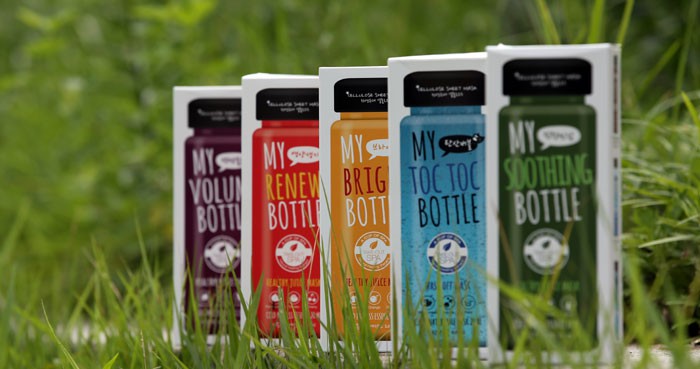
Bottle-shaped face masks contain sheets that have ‘whitening, soothing, brightening and rejuvenating’ functions.
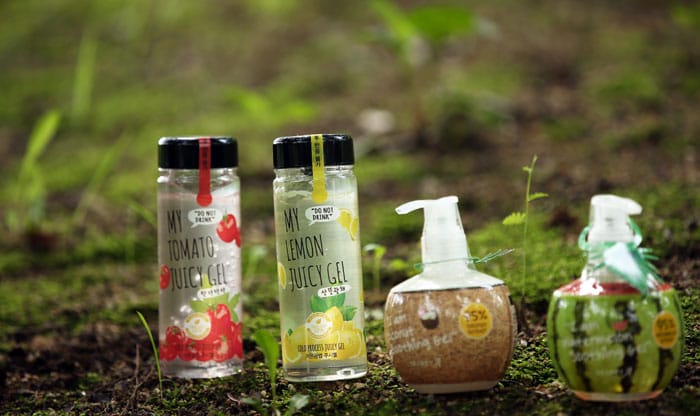
Fragrant gels contain natural ingredients, such as tomatoes, lemons, watermelons and coconut. They are marketed to be used in the summer. To enjoy the ‘instant cooling and soothing’ effect, keep the gels in the refrigerator or other cool place and put them on the face or body immediately after a shower.




